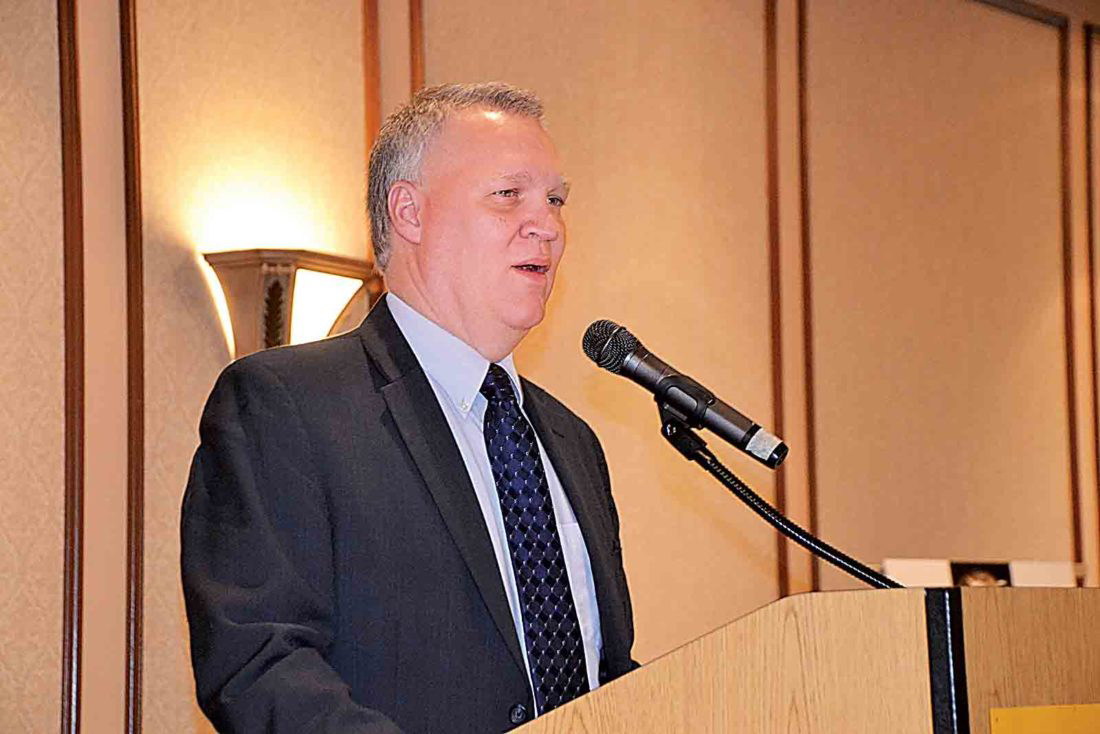By BRETT DUNLAP
The Parkersburg News and Sentinel
CHARLESTON, W.Va. — The Republican leaders of both the state Senate and the House of Delegates said the way forward for West Virginia is building the state’s economy, not increasing taxes on its citizens.

Senate President Mitch Carmichael, R-Jackson, and House Speaker Tim Armstead, R-40th, of Kanawha County, talked with reporters from around the state Thursday morning at the West Virginia Press Association’s Legislative Breakfast at the Embassy Suites Hotel in Charleston.
Thursday marked the start of the second half of the 2017 legislative session, day 31 of a 60-day session, with the state budget continuing to be a major focal point for lawmakers as they weigh around $300 million in proposed tax increases brought forth by Gov. Jim Justice.
Carmichael said these were tough times for the state, but he believed both Republicans and Democrats could find common ground and work to move the state forward.

(Photo by BRETT DUNLAP)
“This is a chance to fundamentally reshape the direction of West Virginia,” he said. “If we miss this opportunity, at this moment and at this time, shame on us.”
Independent sources, including Forbes magazine, ranked West Virginia as one of the most burdensome regulatory schemes in America, he said.
“We want to protect our citizens and our environment with reasonable and appropriate regulation,” Carmichael said.
Legislators want to remove the arbitrary hurdles and burdens to job creators in West Virginia, Carmichael said. “We want to knock those down to get those impediments to progress out of the way,” Carmichael said.
Although West Virginia is ranked as one of the poorest states in the nation, it is one of the top spenders in America on per student expenditures in education, he said.
“The level of performance is not comparative with the level of expenditure,” Carmichael said.
One problem is the centralized nature of the state’s education system with a lot of policy originating and being controlled through the government in Charleston, Carmichael said.
“Our mission should be to return control of the education system back to local teachers, administrators and the counties to enable them to provide the education system best suited for the students in their area,”Carmichael said.
More local control gives educators the ability to create programs that better reach the students in their area, he said. What works in one part of the state may not work in other parts of the state. Local administrators have to be allowed to do what works for their students, Carmichael said.
With civil justice reform, the citizens and businesses have to be put on a more level playing field in the courts comparable to other states around West Virginia, Carmichael said.
“We want our citizens to have adequate redress in the court system,”Carmichael said. “Likewise, we want fair predictable outcomes for our business communities and job creators throughout the country. We want people to come to West Virginia and know they will be treated fairly, honestly and adequately.”
With tax reform, Carmichael said lawmakers will not shy away from doing difficult things.
The state is constantly living in a “boom or bust” economy, he said.
“It doesn’t have to be that way,” Carmichael said.
Lawmakers are looking at what is succeeding in other states, like Texas, Florida, Washington and Tennessee where they have no income tax.
Carmichael admitted it will take some time to get there, but he is excited about the possibilities.
“I am excited to fundamentally overall in which we tax our citizens in West Virginia and put forth a pro growth and pro jobs, pro West Virginia tax system away from this boom or bust cycle.”
Doing that means making the state attractive to job creators so they want to locate here.
“Both the majority party and the minority party have been amazing to work with,” Carmichael said. “These are tough times, but we can come together.”
Armstead said growing government through tax increases is not going solve anything; they need to grow the state’s economy as a whole.

“We do agree with the governor in that we need very bold initiatives to move our state forward,” he said. “We want to work together.”
Armstead used an analogy used by Justice about the state being a medical patient in dire shape.
“The patient is not government,” he said. “It is not government that we need to cure; it is the economy as a whole. We can’t cure it by growing government.”
The state faces an estimated $400 million shortfall for the next fiscal year starting July 1. Justice has proposed around $300 million in tax increases and additional cuts.
Armstead said the budget is continually being worked on by lawmakers.
“We are working on the budget,” he said. “I have never seen a budget pass before day 60 ever. We are taking this budget incredibly seriously. We are working day in and day out. We are talking to agencies and formulating a budget to move the state forward.”
Government raising taxes and spending more money has not solved the state’s problems, he said.
“We need to focus on long term,” Armstead said. “We need to look at the big picture. Charleston can’t solve every problem.”
That includes letting teachers do what they can to reach their students without interference, set standards which protect the state’s citizens and environment, but everything need to be more flexible to do what needs to be done so people can be more successful which in turn will make the state more successful, Armstead said.
“If we give that flexibility, we will see an economy that grows and moves West Virginia forward in a way we haven’t seen before,”Armstead said.
The state needs to allow people to have the resources to create jobs and improve education which will create a healthy economy which then creates a healthy future for the state, Armstead said.
See more from The Parkersburg News and Sentinel






